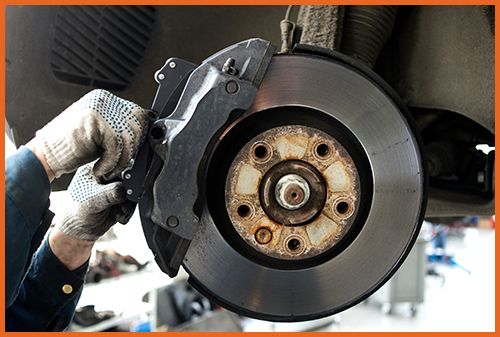What Is a Brake Line and Why It Matters
Your brake lines are essential components of your vehicle’s braking system. They transfer hydraulic pressure from the brake pedal to the brake calipers, enabling your car to stop. Brake fluid stored in the master cylinder travels through these lines when you press the brake pedal. A leak, crack, or full failure in any brake line compromises this system and can lead to total brake failure.
Signs You May Have a Broken or Failing Brake Line
Brake lines wear down over time, especially in vehicles that are driven frequently or exposed to road salt, moisture, and debris. Watch for these common warning signs:
- Leaking brake fluid under the car
- Corrosion or visible rust on brake lines
- Brake warning light illuminated on the dash
- Soft or spongy brake pedal when pressed
- Car pulling to one side while braking
- Unusual grinding or squealing sounds
Most brake lines begin to show signs of deterioration after about 100,000 miles. Timely diagnosis and repair are crucial to avoid a complete loss of braking ability.
What Happens When Brake Lines Fail?
If your brake lines fail while driving, the entire braking system can become unresponsive. Signs such as longer stopping distances, warning lights, and fluid puddles beneath the car should not be ignored. Brake fluid leaks reduce pressure in the system, making it impossible to brake safely.
If You Suspect Brake Line Failure While Driving:
- Pump the brakes repeatedly to build residual pressure.
- Avoid using the emergency brake at high speeds—it can cause you to lose control.
- Pull over immediately and request a tow.
Can You Drive With a Broken Brake Line?
No. Driving with a broken or leaking brake line is extremely dangerous. The loss of hydraulic pressure can cause total brake failure, putting you and others at serious risk. If you suspect any brake issue, have the vehicle towed to a mechanic.
How to Fix a Broken Brake Line
Brake line repair is a labor-intensive job best left to professionals. It involves raising the vehicle, removing wheels, replacing worn or leaking lines, and bleeding the brake system. Here’s an overview of the process:
- Remove the wheel.
- Disconnect and remove the damaged brake line or hose.
- Install a new brake caliper if needed.
- Reattach the brake hose.
- Bleed the brake system.
- Refill the master cylinder with brake fluid and check for firmness.
Average Cost to Repair or Replace Brake Lines
Brake line repair costs vary widely depending on the vehicle make and the severity of the damage. Here’s a breakdown of typical costs:
- Individual brake line replacement: $150–$500
- Labor costs: $45–$100
- Total brake line replacement (all four): $1,000–$2,000
- Brake caliper replacement: $100–$175 each
- Brake rotor replacement: $50–$150 per rotor
- Master cylinder replacement: $200–$300
- Total brake system overhaul: $1,500–$3,000
These costs can quickly add up, especially if multiple components are affected. It’s critical to get a quote from a certified technician and evaluate the full scope of damage.
Do Brake Line Materials Affect Cost?
Yes. Different types of brake lines vary in cost, flexibility, and longevity:
- Galvanized steel: Durable and affordable, but rusts easily.
- Soft steel: Easier to bend and rust-resistant, but pricier.
- Stainless steel: High-end choice, heat-resistant and rust-proof.
- Nickel-copper alloy: Flexible, rust-proof, and cost-effective—but may be harder to find.
Choosing the right material impacts both cost and long-term performance.
Should You Repair or Sell a Car With Brake Line Damage?
If brake repairs cost more than your car’s value—or if multiple issues exist—it may not make financial sense to fix it. Instead, consider selling your car in its current condition.
DamagedCars.com Can Help You Sell a Vehicle With Brake Problems
DamagedCars.com specializes in buying vehicles with brake line issues, accident damage, or mechanical problems. Here’s how easy it is:
- Get a free quote – Submit your car details online.
- Schedule pickup – Our local partner will come to you within 24–48 hours.
- Get paid on the spot – No fees, no haggling, no worries.
We offer a fast, simple, and fair way to sell your car as-is—without costly repairs or towing headaches.
Conclusion: Know Your Brake Lines and Your Options
Brake line failure is a serious issue that can’t be ignored. Watch for signs like fluid leaks, soft pedals, and braking delays. Repairs can cost hundreds or even thousands depending on the damage. If your car isn’t worth fixing, you have options.
DamagedCars.com helps you turn a difficult decision into an easy one. Skip the repair bill, avoid the risk, and get paid fast.



